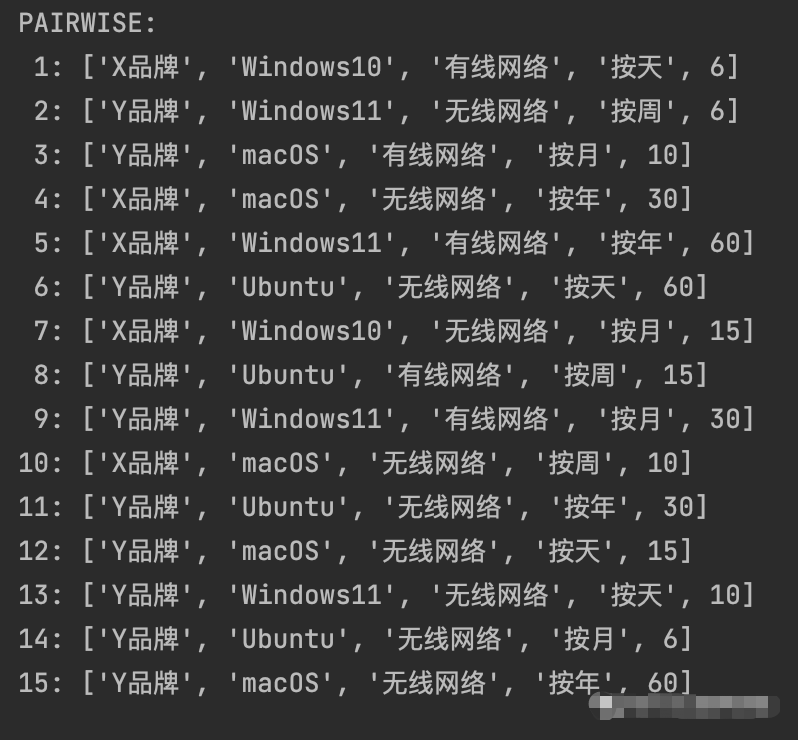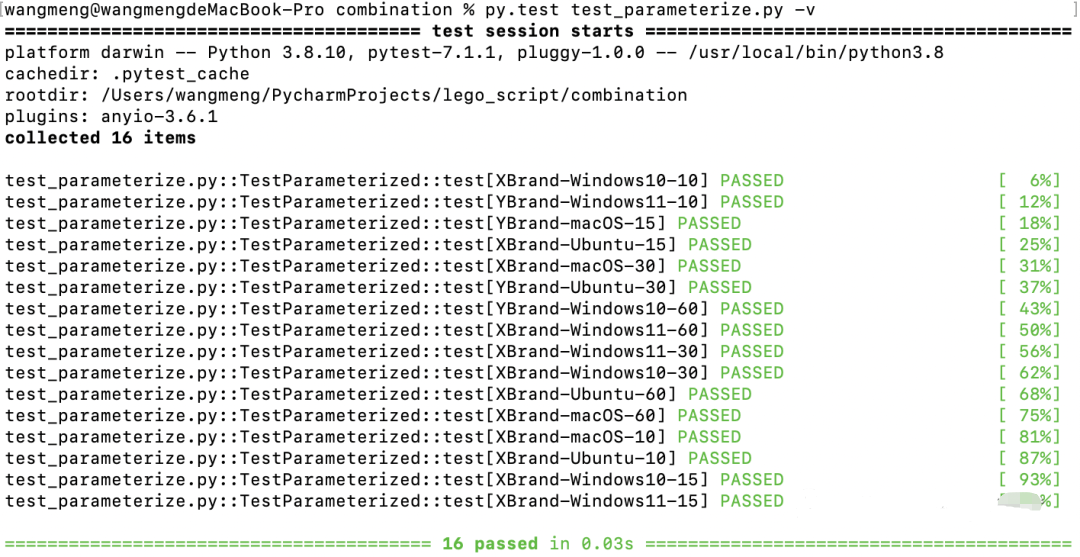测试组合生成器-allpairspy

1、前言
在我们写功能用例时,常常会遇到多个参数有很多的选项,而如果想把这些参数值都要覆盖执行的话,工作量可想而知。那有没有什么办法既可以减少用例数量,也可以保证用例质量又降低测试时间成本,本篇将介绍一款工具 allpairspy,可以满足此需求。
2、简介
allpairspy 是一个用 Python 编写的开源测试组合生成器。生成器允许你使用“成对组合”方法创建一组测试,将变量组合的数量减少到涵盖大多数情况的较小集合中。
特点:
1、生成足够好的数据集。
2、Python 迭代器风格的枚举接口。
3、允许在搜索下一个组合时过滤掉“无效”组合。
安装依赖:
Python?2.7+?或?3.5+
安装命令:
pip?install?allpairspy除了 allpairspy,还有很多成对测试工具:
https://www.pairwise.org/tools.html
例如?Pairwise?Pict?Online,在线生成成对测试工具
https://pairwise.yuuniworks.com/
参数数据与限制条件

?在线生成后的结果

?有关成对测试的更多信息,请参阅?
http://www.pairwise.org
3、基本用途
如代码所示,参数里有5组数据,每组数据有不同的参数,如果按照全量的组合,那么就是2*4*2*4*5=320条用例。通过引用 allpairspy 包,来创建成对组合。
#!/usr/bin/env python
# -*- coding: utf-8 -*-
# 公众号:咖啡加剁椒
from allpairspy import AllPairs
parameters = [
["X品牌", "Y品牌"],
["Windows10", "Windows11", "macOS", "Ubuntu"],
["有线网络", "无线网络"],
["按天", "按周", "按月", "按年"],
[6, 10, 15, 30, 60]
]
print("PAIRWISE:")
for i, pairs in enumerate(AllPairs(parameters)):
print("{:2d}: {}".format(i+1, pairs))
通过执行后的结果,可以看出 allpairspy 将用例条数缩减至22条。

4、过滤
有些时候,参数的某个特定值与其他参数值之间的组合是无效的,这个时候就应该排除这个组合。
代码里可以通过在 AllPairs 构造函数中将过滤函数设置为 filter_func 来限制对。
如代码所示,设置了3个过滤条件。
#!/usr/bin/env python
# -*- coding: utf-8 -*-
# 公众号:咖啡加剁椒
from allpairspy import AllPairs
def is_valid_combination(row):
"""
这是一个过滤功能,筛选函数应返回True
如果组合有效,则为False,否则为False
"""
n = len(row)
if n > 1:
# Y品牌不支持Windows10
if "Windows10" == row[1] and "Y品牌" == row[0]:
return False
# X品牌不支持Ubuntu
if "Ubuntu" == row[1] and "X品牌" == row[0]:
return False
if n > 4:
# 按年要大于30分钟进行计算
if "按年" == row[3] and row[4] < 30:
return False
return True
parameters = [
["X品牌", "Y品牌"],
["Windows10", "Windows11", "macOS", "Ubuntu"],
["有线网络", "无线网络"],
["按天", "按周", "按月", "按年"],
[6, 10, 15, 30, 60]
]
print("PAIRWISE:")
for i, pairs in enumerate(AllPairs(parameters, filter_func=is_valid_combination)):
print("{:2d}: {}".format(i+1, pairs))
通过执行后的结果,可以看出设置过滤后用例条数缩减至15条

5、有序字典
当输入的参数为字典时,可以使用 collections.OrderedDict?实例作为 AllPairs 构造函数的参数,对作为 collections.namedtuple 实例返回。
#!/usr/bin/env python
# -*- coding: utf-8 -*-
# 公众号:咖啡加剁椒
from collections import OrderedDict
from allpairspy import AllPairs
parameters = OrderedDict({
"品牌": ["X品牌", "Y品牌"],
"操作系统": ["Windows10", "Windows11", "macOS", "Ubuntu"],
"分钟": [15, 30, 60]
})
print("PAIRWISE:")
for i, pairs in enumerate(AllPairs(parameters)):
print("{:2d}: {}".format(i+1, pairs))
执行后的结果。

6、使用pytest进行成对参数化测试
可以将 allpairspy 结合到单元测试框架 pytest 里,进行成对参数化测试。
#!/usr/bin/env python
# -*- coding: utf-8 -*-
# 公众号:咖啡加剁椒
import pytest
from allpairspy import AllPairs
# 使用pytest进行成对参数化测试
def function_to_be_tested(brand, operating_system, minute):
# do something
return True
class TestParameterized(object):
@pytest.mark.parametrize(["brand", "operating_system", "minute"], [
value_list for value_list in AllPairs([
["XBrand", "YBrand"],
["Windows10", "Windows11", "macOS", "Ubuntu"],
[10, 15, 30, 60]
])
])
def test(self, brand, operating_system, minute):
assert function_to_be_tested(brand, operating_system, minute)
执行命令:
py.test test_parameterize.py -v执行后的结果,共生成了16条用例。

最后感谢每一个认真阅读我文章的人,礼尚往来总是要有的,虽然不是什么很值钱的东西,如果你用得到的话可以直接拿走:
这些资料,对于【软件测试】的朋友来说应该是最全面最完整的备战仓库,这个仓库也陪伴上万个测试工程师们走过最艰难的路程,希望也能帮助到你!?

本文来自互联网用户投稿,该文观点仅代表作者本人,不代表本站立场。本站仅提供信息存储空间服务,不拥有所有权,不承担相关法律责任。 如若内容造成侵权/违法违规/事实不符,请联系我的编程经验分享网邮箱:chenni525@qq.com进行投诉反馈,一经查实,立即删除!
